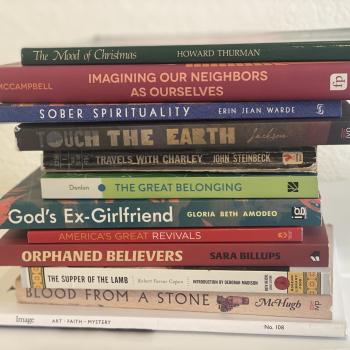So what do we do? Aside from working at breaking through the stigma of suicide, we need to point people to the powerful reality and symbol of the cross. God entering history in Jesus Christ validates the deepest and darkest of human suffering. The physical pain on the cross must have paled in comparison to the mental, spiritual, and emotional anguish of Jesus' separation from the Father. And let's not forget what the German theologian Jurgen Moltmann has suggested: that the suffering of Jesus surely affected the Father (and the Spirit) as well. Did not the Trinity suffer together at the cross?
Of course, the thought of God suffering will not be an immediate, easy, or quick balm or cure to the depressed and suicidal. But it does show that at the very core of Christianity lies the often-inexplicable experience of suffering. Joy comes in the morning, yes, but morning has not yet come. The resurrection of Christ has happened (and that is our hope), but we are, in one sense, still living in Holy Saturday, that period of unknowing, uncertainty, incompleteness. It's hard to keep it all in proper balance. We certainly don't want to underplay the resurrection. But it may be that for those dwelling in the darkest of places, the place for hope will ironically lie in our greatest symbol of pain and suffering.
As Greene-McCreight puts it, "despair can live with Christian faith." Too often in our preaching, our liturgies, our songs, our prayers, we forget to make space for the despairing. And so they feel they do not belong. Eventually, God drops out of view because they feel confirmed in their intuition that either God takes no interest in them, or this world has no room for them -- or both.
The church, of all places, ought to create a warm space for vulnerable people to share with and lean on each other in times of crisis and loneliness. Instead, we too often create an environment that is only conducive to and welcoming of the healthy, happy, and holy.
We must remind others and ourselves that it is only human to need help and seek help.
Striving for greater empathy does not require an affirmation of the act of suicide as an escape from the struggles of life. Things can swing too far that way, too. Augustine and Aquinas were at least right to insist that life is a gift that ought not be treated lightly. And our lives, when they are taken too soon, for whatever reason, have deep and lasting consequences on those we leave behind. Cawthorne Crafton reminds those in the darkness of suicidal depression that, eternal destiny notwithstanding, there is no free lunch -- either in life or in death.
Nonetheless, may the church be a community in which the despairing and despondent can find rest, understanding, empathy and -- above all -- hope, at the foot of the cross.
Kyle Roberts is Assistant Professor of Systematic Theology and Lead Faculty of Christian Thought, Bethel Seminary (St. Paul, MN). He researches and writes on issues related to the intersection of theology, philosophy, and culture. Follow Kyle Roberts' reflections on faith and culture at his blog, http://kylearoberts.com/.





